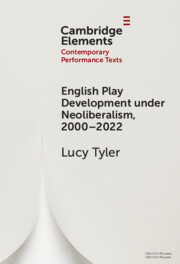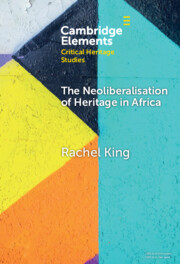454 results
Epilogue
-
- Book:
- Political Theology and the Conflicts of Democracy
- Published online:
- 21 March 2025
- Print publication:
- 03 April 2025, pp 327-334
-
- Chapter
- Export citation
Cash rules everything around me: in defence of housing markets
-
- Journal:
- Economics & Philosophy , First View
- Published online by Cambridge University Press:
- 19 March 2025, pp. 1-19
-
- Article
-
- You have access
- Open access
- HTML
- Export citation

English Play Development under Neoliberalism, 2000–2022
-
- Published online:
- 18 March 2025
- Print publication:
- 17 April 2025
-
- Element
-
- You have access
- Open access
- HTML
- Export citation
The Constitution Must Be Defended: Thoughts on the Constitution's Role in Japan's Postwar Democracy
-
- Journal:
- Asia-Pacific Journal / Volume 16 / Issue 20 / October 2018
- Published online by Cambridge University Press:
- 14 March 2025, e3
-
- Article
- Export citation
Life in Nature Documentaries: Narrating Counterurbanization and Masculinity in Post-Developmental South Korea
-
- Journal:
- Asia-Pacific Journal / Volume 22 / Issue 9 / September 2024
- Published online by Cambridge University Press:
- 14 March 2025, e1
-
- Article
-
- You have access
- Export citation
Individual, National, General – Obscuring Poverty in Post-Pandemic Japan
-
- Journal:
- Asia-Pacific Journal / Volume 22 / Issue 5 / May 2024
- Published online by Cambridge University Press:
- 14 March 2025, e5
-
- Article
-
- You have access
- Export citation
Re-Imagining Housing Provision from Markets to Welfare
-
- Journal:
- German Law Journal / Volume 25 / Issue 9 / December 2024
- Published online by Cambridge University Press:
- 17 February 2025, pp. 1525-1544
-
- Article
-
- You have access
- Open access
- HTML
- Export citation

Multiscriptal English in Transliterated Linguistic Landscapes
-
- Published online:
- 07 February 2025
- Print publication:
- 13 February 2025
-
- Element
- Export citation
11 - A Fractured Dream of the Decolonisation and De-eliticisation of English within EMI Programmes in South Asia
- from Part III - The Politics of English in Education
-
-
- Book:
- Critical English Medium Instruction in Higher Education
- Published online:
- 31 January 2025
- Print publication:
- 06 February 2025, pp 183-199
-
- Chapter
- Export citation
5 - Entrepreneurial Orientations towards Language and Education
- from Part I - Ideologies and Educational Policies
-
-
- Book:
- Critical English Medium Instruction in Higher Education
- Published online:
- 31 January 2025
- Print publication:
- 06 February 2025, pp 70-86
-
- Chapter
- Export citation
13 - The Neoliberal Revolution
- from V - 1976– : A New Liberalism?
-
- Book:
- Modern Britain, 1750 to the Present
- Published online:
- 14 January 2025
- Print publication:
- 30 January 2025, pp 483-525
-
- Chapter
- Export citation
Epilogue
-
- Book:
- Modern Britain, 1750 to the Present
- Published online:
- 14 January 2025
- Print publication:
- 30 January 2025, pp 526-535
-
- Chapter
- Export citation
1 - Global Leaders in the 21st Century
- from Part I - The New Global Context
-
- Book:
- International Management Behavior
- Published online:
- 15 March 2025
- Print publication:
- 16 January 2025, pp 7-31
-
- Chapter
- Export citation

The Neoliberalisation of Heritage in Africa
-
- Published online:
- 11 January 2025
- Print publication:
- 30 January 2025
-
- Element
- Export citation
6 - Pursuing Entrepreneurship for Employment
-
- Book:
- Millennial Dreams in Oil Economies
- Published online:
- 02 January 2025
- Print publication:
- 09 January 2025, pp 242-281
-
- Chapter
- Export citation
Conclusion
-
- Book:
- Millennial Dreams in Oil Economies
- Published online:
- 02 January 2025
- Print publication:
- 09 January 2025, pp 282-289
-
- Chapter
- Export citation
“I Was Trusted for Once”: Imagining More Humane Income Supports Through the Ontario Basic Income Pilot
-
- Journal:
- Social Policy and Society , First View
- Published online by Cambridge University Press:
- 23 December 2024, pp. 1-16
-
- Article
-
- You have access
- Open access
- HTML
- Export citation
Chapter 21 - Malcolm Bradbury
- from Part IV - 1975–Present
-
-
- Book:
- The British Novel of Ideas
- Published online:
- 05 December 2024
- Print publication:
- 12 December 2024, pp 361-377
-
- Chapter
- Export citation
Conclusion
-
- Book:
- Money, Value, and the State
- Published online:
- 05 December 2024
- Print publication:
- 12 December 2024, pp 304-326
-
- Chapter
- Export citation
1 - LGBTIQ Psychology in Context
- from Part I - History and Context
-
- Book:
- Lesbian, Gay, Bisexual, Trans, Intersex, and Queer Psychology
- Published online:
- 12 December 2024
- Print publication:
- 12 December 2024, pp 3-13
-
- Chapter
- Export citation


